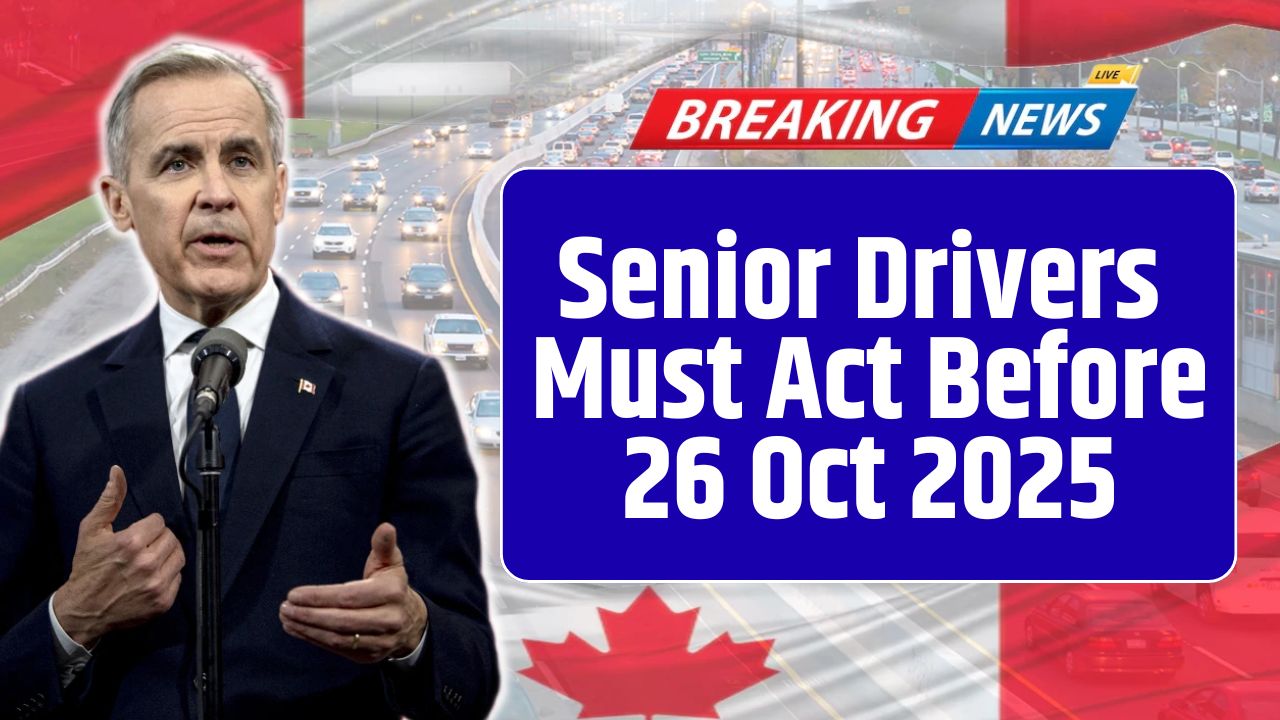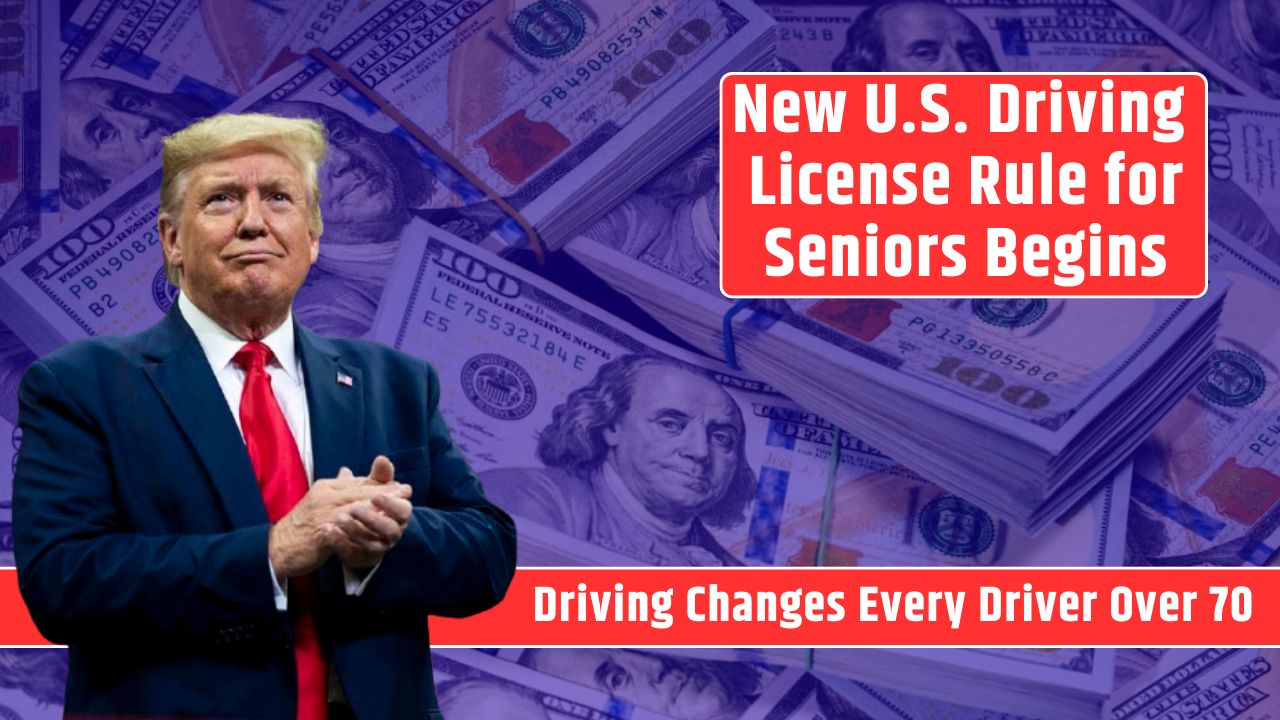For millions of older Americans, driving isn’t just a way to get around—it’s a lifeline. It means independence, control, and connection to the world beyond their doorstep. But as America’s population grays, state officials are quietly rewriting the rules for how long seniors can stay behind the wheel without a check-up.
Starting in 2025 and 2026, many states will tighten driver’s license renewal requirements for those aged 70 and over—introducing more frequent renewals, mandatory vision screenings, and in-person testing in some cases. Officials say the goal isn’t to take away keys, but to make aging drivers safer and keep roads secure.
Why States Are Revising Senior License Rules
According to the Federal Highway Administration (FHWA), there are now nearly 50 million licensed drivers aged 65 and above—a record high. That number has surged by more than 70% since 2000. Most seniors are cautious, experienced drivers, but aging can affect reaction times, vision, mobility, and hearing, which in turn may raise accident risks under certain conditions.
Transportation agencies stress this is not about punishing older drivers. Instead, the aim is to identify potential safety concerns early and provide support.
As one official from the National Highway Traffic Safety Administration (NHTSA) put it:
“We’re not taking licenses away—we’re making sure people have the tools to drive safely for as long as possible.”
The updated rules also reflect a wider shift in public policy: encouraging mobility without compromising safety, especially as vehicles, traffic volumes, and digital driving systems grow more complex.
Key Changes in Senior Driver’s License Renewals
The new guidelines differ by state, but the general trend is clear—more frequent reviews and hands-on renewals for older drivers.
Here’s what most seniors can expect:
1. Shorter Renewal Periods
Many states have reduced renewal cycles for senior drivers to 3–5 years, compared to the 8–10 year cycle for younger drivers.
- California: 5 years for drivers aged 70+.
- Florida: 6 years for those 80+, down from 8.
- Illinois: 2 years for drivers 81–86; 1 year for 87+.
This ensures regular health and vision updates without overburdening the DMV system.
2. Mandatory Vision Tests
Nearly all states now require a vision screening at every renewal once a driver reaches 70 or 75.
- Some DMVs partner with certified optometrists, allowing seniors to submit an eye exam form instead of visiting a testing center.
- The standard requirement is typically 20/40 vision or better for unrestricted licenses.
3. In-Person Renewals
Several states, including California, Florida, Illinois, Nevada, and Texas, now mandate in-person renewals at least once after age 70. This helps DMV staff verify identity, assess mobility, and discuss any reported medical issues.
- Seniors may still renew by mail or online in alternate years if no health or vision concerns are noted.
4. Medical or Cognitive Assessments
If a driver reports certain medical conditions—or if family or law enforcement raises safety concerns—the DMV may request a doctor’s evaluation or cognitive screening.
- Conditions like dementia, Parkinson’s disease, diabetes, or seizure disorders often trigger additional review.
- Some states now use short computerized reaction-time tests to gauge awareness and reflexes.
5. Written or Behind-the-Wheel Tests (If Needed)
In cases of repeated accidents or moving violations, drivers may be asked to take a limited written or driving test to confirm road readiness.
- The process is designed to be supportive rather than punitive.
- Most seniors pass on the first try with minimal difficulty, according to DMV statistics.
| Requirement | Typical Age Trigger | Purpose |
|---|---|---|
| Shorter Renewal Cycle | 70–75 | Keep health and vision records updated |
| Vision Test | Every renewal after 70 | Detect visual decline |
| In-Person Renewal | 70–75 | Verify medical and cognitive fitness |
| Medical Clearance | Case-by-case | Address specific health issues |
| Road or Written Test | After violations or referrals | Confirm driving ability |
How to Renew Under the New Rules
Most states will begin rolling out these updates in stages between 2025 and 2026. Here’s how to stay prepared:
- Check your state DMV website — Rules vary. Some states like Arizona and Colorado already have shorter renewal periods in place.
- Bring valid ID and proof of residence. Most DMVs will require your current license, address documentation, and Social Security number.
- Expect a vision test or health form. Bring glasses or contact lenses if you use them.
- Update your photo and signature. In-person renewals always require a new photo.
- Pay the renewal fee. Costs range from $25 to $50, depending on state.
If your state requires a medical form, it must usually be signed by your doctor, optometrist, or neurologist confirming your fitness to drive.
Tips for Staying Road-Ready After 70
The goal is to keep seniors safely on the road—not off it. A few proactive habits can make a huge difference:
- Get annual eye and hearing exams. Early detection of cataracts or hearing loss helps avoid safety risks.
- Review medications. Ask your doctor whether any prescriptions cause drowsiness or slow reaction times.
- Take a senior driving refresher course. Both AARP and AAA offer short online or in-person courses, often leading to insurance discounts.
- Avoid high-risk driving conditions. Limit driving at night, in poor weather, or during rush hour if it feels stressful.
- Stay active. Physical fitness helps maintain flexibility and reaction speed behind the wheel.
Public Reaction and Expert Opinion
Reactions among seniors are mixed. Many welcome the new rules, viewing them as common-sense safety checks, while others see them as an unnecessary hurdle.
AAA spokesperson Mark Jenkins said the organization supports periodic evaluations:
“Most older drivers self-regulate. These measures give them confidence that they’re still safe and capable.”
However, advocacy groups like The American Seniors Association warn that stricter testing could disproportionately affect rural seniors with limited access to public transit.
Transportation departments counter that the changes come with expanded mobility options, including:
- Community shuttle programs
- Discounted senior ride-share vouchers
- State-funded door-to-door paratransit for non-drivers
FAQs:
Do all states require senior drivers to retake a test?
No. Most states only require more frequent renewals and vision checks, not full driving tests.
Will I lose my license at 70?
Absolutely not. As long as you meet the basic vision and health requirements, you can continue driving.
Can I renew online after 70?
In some states, yes — if you pass an approved eye exam or submit medical documentation. Others require in-person renewal.






















